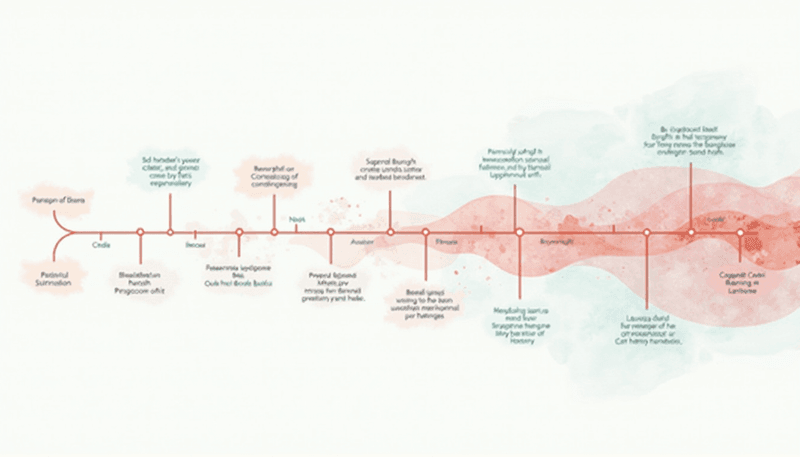What Every Woman Should Know About Menopause

Did you know that by 2030, there will be 280 million postmenopausal women in China alone? These numbers tell us something important - menopause isn't just a personal journey, it's a significant public health matter that deserves our attention. Read the latest research on menopause diagnosis and treatment that's changing how we approach this natural life transition.
Understanding Your Body's Timeline
When I talk with my readers about menopause, the first question is usually "When will it happen to me?" Here's what science tells us: menopause isn't a sudden event - it's more like a gradual sunset. The transition typically begins in your 40s and can last several years. During this time, your ovaries gradually reduce their production of hormones, particularly estrogen and progesterone.
"Think of your reproductive system like a symphony orchestra - perimenopause is when some instruments start playing softer, while others might occasionally hit an unexpected note."
The journey happens in stages:
- Early Changes (Late 30s to Early 40s): Subtle shifts in period length
- Perimenopause (40s): More noticeable changes in cycle regularity
- Menopause (Average age 51): Defined as 12 months without a period
- Post-menopause: The years following menopause
The Body's Symphony of Changes
Having dealt with hormonal issues myself through PCOS, I understand how overwhelming body changes can feel. During perimenopause, you might experience:
- Hot flashes (affecting up to 75% of women)
- Sleep disruptions
- Mood changes
- Vaginal dryness
- Changes in bone density
Here's what you can do right now:
- Start a symptom diary
- Keep your bedroom cool and well-ventilated
- Practice stress-reduction techniques
- Get regular exercise
- Maintain a balanced diet rich in whole grains and vegetables
What symptoms are you experiencing? Have you started tracking them yet?
Modern Treatment Approaches
The research presents exciting news about treatment options. While hormone therapy remains a leading treatment, there's growing evidence supporting lower-dose options and alternative approaches.
For those considering hormone therapy:
- Start with the lowest effective dose
- Consider non-oral options like patches or gels
- Regular monitoring is essential
- The "time window" concept suggests starting before age 60
For those seeking non-hormonal options:
- Traditional Chinese medicines like Kuntai Capsules
- Black Cohosh supplements
- Lifestyle modifications
- Regular exercise (150 minutes per week recommended)
"Your menopause journey is unique - what works for your friend might not work for you, and that's perfectly normal."
Diet and Lifestyle: Your Daily Toolkit
Research highlights the power of daily choices in managing menopause symptoms. Here's what science suggests:
Dietary Recommendations:
- Whole grain fiber: 25-30g daily
- Fresh fruits and vegetables: 5+ servings
- Fish: At least twice weekly
- Daily water intake: 1,500-1,700ml
- Limited sugar: ≤50g daily
- Reduced salt: ≤6g daily
Physical Activity Goals:
- 150-300 minutes of moderate exercise weekly
- 75-150 minutes of vigorous activity
- 6,000 steps daily average
- Resistance training 2-3 times weekly
What small change could you make to your diet or exercise routine this week?
Looking ahead, research continues to evolve, bringing new understanding and treatment options. The key is staying informed and working with healthcare providers to find your optimal path through this transition.
Your Next Steps:
- Schedule a check-up with your healthcare provider
- Start tracking your symptoms and cycles
- Evaluate your current diet and exercise routine
- Consider joining a support group or online community
Remember, menopause isn't just an ending - it's a new beginning. Take one small step today toward better understanding and managing your journey through this natural life transition.

Olivia Rose Chen-Martinez
Olivia Rose Chen-Martinez is a seasoned health and wellness writer with a focus on women’s health issues, including PCOS, perimenopause, and holistic wellness. With a background in Journalism and Public Health from UC Berkeley, Olivia draws on over 15 years of writing experience to deliver empathetic, research-backed insights. Her work blends personal anecdotes and actionable advice, resonating with readers seeking accessible and trustworthy information. Based in Austin, Texas, Olivia is also a certified yoga instructor and a dedicated advocate for balanced, integrative approaches to women’s health.








